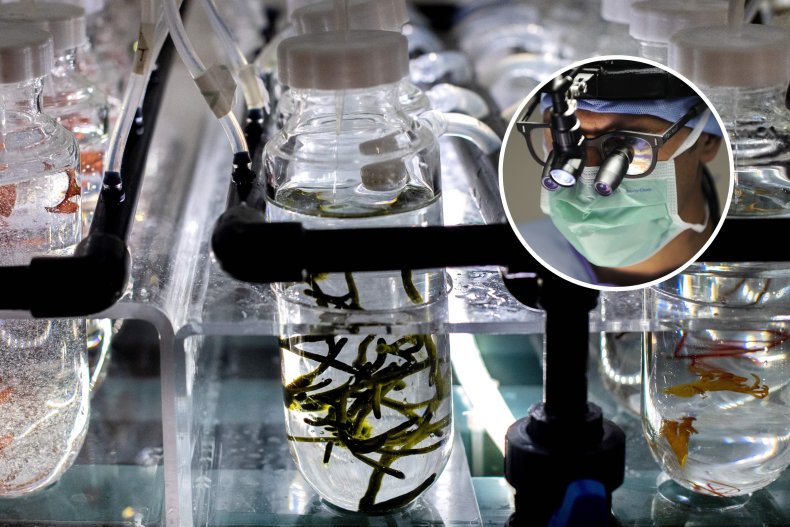Seaweed Could Be Key to More Successful Heart Surgeries, Study Suggests

Researchers are turning to a surprising substance in hopes of improving heart bypass surgeries, according to a new study.
Seaweed—the marine algae that covers beaches across the world—could be key to improving the surgeries, which are conducted to restore blood flow to areas of the heart where vessels have become blocked, according to the University of Waterloo study. A team of researchers, led by Dr. Evelyn Yim, is using a natural material derived from seaweed known as fucoidan to modify synthetic blood vessels.
Fucoidan, when applied with a technique known as micropatterning, promotes the growth of vascular cells around the inner surface of a graft, which is used to redirect the flow of blood around a blocked artery.
This development could potentially have significant benefits for heart surgery patients, Yim told Newsweek on Monday.

Fred Tanneau/AFP/Getty; Jean-Sebastien Evrard/AFP/Getty
Grafts that do not allow for vascular cells to grow on the inside of an artery of a vessel carry a higher chance of blood clots and can develop into larger blockages or cause inflammation, therefore limiting the flow of blood. The grafts being developed by Yim’s team, however, allow for blood vessel growth. This could result in fewer complications and a higher quality of life for heart bypass surgery patients, according to Yim.
“In the long run, it will prevent complications like blood clotting,” she said. “And it will keep the function of the vascular graft lasting longer.”
Yim compared the principle behind her research to moving into a new home, comparing the synthetic graft to a yard that does not have any grass, trying to avoid weeds—or blot clots—from emerging.
“To let the patients’ cells grow is like we are laying down a very good layer of lawn or grass. And then if we have a good layer of cells, in that case layers of grass, then we can prevent weeds from growing,” she said.
Her team’s research could also reduce the risk of a recurrence of future blockages that would require more drug treatment or surgery. Yim said it could also have implications for other medical conditions including kidney failure and blood clots in the legs.
The technique has been tested on small animals, including rabbits. Yim plans to expand the technique’s testing into large animals before advancing to clinical trials. Yim estimated that it would take 5-10 years to reach that stage.
She stressed that her use of nanotechnology will allow the cells to migrate throughout the graft, achieving complete coverage.
“We need complete coverage of the inner surface with the cells,” she said. “If it was just the fucoidan molecule without the nanotechnology, we will not be able to get a fully covered inner surface. So one of the important key of this study is the combination of the nanotechnology as well as the fucoidan molecule.”
Researchers at the University of Waterloo’s Department of Chemical Engineering and the Oregon Health and Science University also collaborated on this project.
This study could have significant ramifications for millions of people. Each year, an estimated 170,000 people across the United States alone undergo heart bypass surgery, according to Columbia University. The surgery has a success rate of about 98 percent.
The surgery typically involves connecting a healthy blood vessel from the chest or leg area below the blocked heart artery to improve blood flow to the heart, according to the Mayo Clinic. It is at times performed to treat a heart attack, which can be fatal if not treated.



